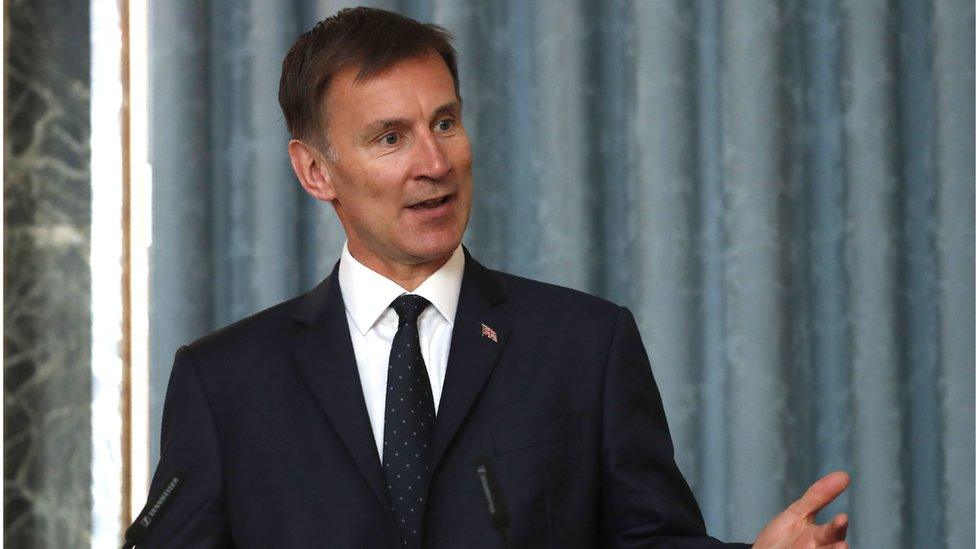Jeremy Hunt backs stronger protections for Christians worldwide
- Published

There needs to be a "sea-change" in how the UK treats worldwide anti-Christian persecution, Foreign Secretary Jeremy Hunt has said.
A review, external into the issue ordered by Mr Hunt said the UK should be prepared to sanction abusers of religious rights.
Mr Hunt said the government's response to discrimination hasn't always "matched the scale of the problem".
He said he would fully accept the report's recommendations if he becomes PM.
The report, written by the Bishop of Truro the Right Reverend Philip Mounstephen, also suggested the UK should adopt a definition of anti-Christian discrimination.
It said the Foreign Office should identify the "particular character" of discrimination against Christians, alongside "similar definitions for other religions".
Boris Johnson, Mr Hunt's rival in the Conservative leadership race, also signalled his backing for the report.
Allow X content?
This article contains content provided by X. We ask for your permission before anything is loaded, as they may be using cookies and other technologies. You may want to read X’s cookie policy, external and privacy policy, external before accepting. To view this content choose ‘accept and continue’.

Mr Hunt said he thought officials should clearly call out specific anti-Christian hatred using the term 'Christophobia'.
"We need to recognise that there is a specific Christian-related issue that goes beyond the championing of freedom of religious belief," he added.
The bishop's report estimated estimated that one in three people suffer from religious persecution, with Christians the most persecuted religious group.
'Not about special pleading'
It said this ranged from routine discrimination in areas such as education and employment, to "genocidal attacks" in certain parts of the world.
It added there has been an "exodus" of Christians from the Middle East and North Africa, where they are estimated to make up less than 4% of the total population, down from 20% a century ago.
"This is not about special pleading for Christians, but making up a significant deficit," the bishop wrote.
"There is a sense that for a number of reasons we have been blind to this issue - and those reasons would certainly include post-colonial guilt: a sense that we have interfered uninvited in certain contexts in the past so we should not do so again."
UN resolution urged
He added that it is "vital to acknowledge" historical persecution of others by Christians, such as the Crusades, the Inquisition and pogroms.
"Some of the violence in the Central African Republic has very likely been initiated by Christian militia.
"And responsibility for the dreadful massacre of 8,373 Bosniaks in Srebrenica in July 1995 must be laid squarely at the feet of those who professed Christian faith."
Other recommendations in his report include religious training for Foreign Office staff and for the UK to push for a UN resolution urging countries in the Middle East and North Africa to protect Christians.
The Archbishop of Canterbury, Justin Welby, said he hoped the "powerful" report would prompt further government action.
Allow X content?
This article contains content provided by X. We ask for your permission before anything is loaded, as they may be using cookies and other technologies. You may want to read X’s cookie policy, external and privacy policy, external before accepting. To view this content choose ‘accept and continue’.

"We are working across government to agree a formal, collective response as soon as possible," Mr Hunt said.
"But I can confirm that if I become the next prime minister, I will accept the recommendations in full."
Mr Hunt is currently running against former foreign secretary Boris Johnson to become Conservative leader and next occupant of No 10.
The party's 160,000 or so eligible members have started voting, with winner of the contest set to be announced on 23 July.
- Published26 December 2018
